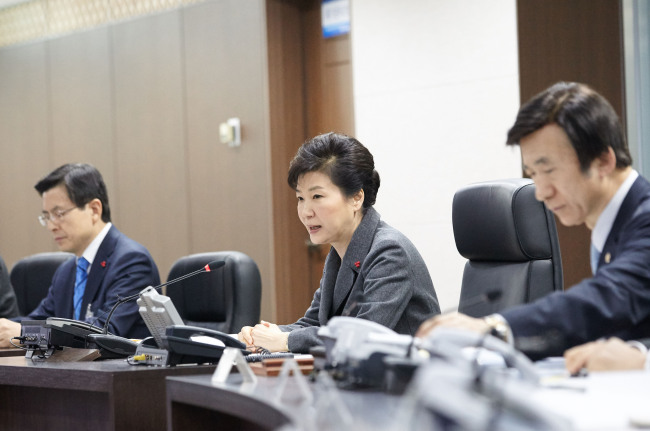North Korea’s purported hydrogen nuclear bomb test Wednesday sent the inter-Korean relationship immediately to the top of priorities in the forthcoming April general elections here.
Throughout the years, military provocations from the North have often promoted the public’s awareness on national security, acting in favor of the conservative party in elections.
But given the inter-Korean connection has increasingly stiffened under the incumbent Park Geun-hye administration, there is also a chance the presidential office and the ruling camp may face the blame for diplomatic failure.
As soon as North Korea announced the test, Cheong Wa Dae immediately voiced its denouncement.
“(North Korea’s hydrogen bomb test) is a grave provocation against our national security, a threat to the survival and future of our people and a head-on challenge to world peace,” said President Park at an emergency meeting of the National Security Council.
“The government should make sure, in close cooperation with the international society, that North Korea pays a reciprocal price.”
 |
| President Park Geun-hye chairs the National Security Council on Wednesday, shortly after North Korea’s announcement on its purported nuclear bomb test. Cheong Wa Dae |
The president’s hard-lined response reiterated her recent pledge to stand strong against the neighboring communist state.
“National security is the basic foundation of state development,” Park had said in her New Year’s statement.
“We will respond sternly to the North’s provocations, while always keeping the door open for communication so that we may move forward to peaceful unification.”
The state leader also took the opportunity to urge political parties to stop their strife and focus on the pressing matter at hand.
“It is especially in times like this that the nation should maintain stability,” Park said.
“I demand that political circles stop all fights and work for the sake of people’s safety.”
Political parties voiced their dissent en bloc, but their respective tone and manner showed subtle differences.
“The North Korean regime should immediately stop its inhumane practices of pumping astronomical amounts of money into nuclear weapons while its people are starving amid an economic disaster,” said the ruling Saenuri Party’s chief spokesperson Kim Young-woo.
He referred to the North’s action as a “head-on challenge to the lives of 80 million people and to the peace of the Korean Peninsula.”
The main opposition Minjoo Party of Korea, on the other hand, remained relatively temperate.
“Our party will make all efforts to cooperate with the government and overcome the crisis on the Korean Peninsula, as national security is a transpartisan issue,” said party spokesperson Yoo Eun-hye.
The president and her conservative party have reason to take on a strong offensive when it comes to North Korean affairs.
In December 2012, a week before the 18th presidential election, North Korea had launched a long-range missile, which further added tension to the inter-Korean relations, but, at the same time, drew national security-sensitive voters to the Saenuri camp.
This acted in favor of then-candidate Park and against rival Moon Jae-in, who was accused of supporting the late former President Roh Moo-hyun in disavowing the Northern Limit Line, a sea border between the two Koreas, in a closed-door collusion.
Moon at the time accused the Saenuri Party of using ideological conflicts and North Korean factors as an election campaign trick.
But a challenge for the incumbent president is the criticism that she has failed to improve inter-Korean diplomacy and curb North Korea’s nuclearization process, which had already worsened under the previous Lee Myung-bak administration.
A vice ministerial talk between the two Koreas, the first formal meeting in years, broke down in December due to irreconcilable gaps on stalled tours to Mount Geumgangsan and reunions of separated families.
By Bae Hyun-jung (tellme@heraldcorp.com)

